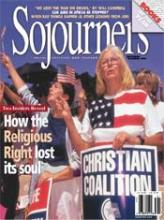The hardest thing wasnt choosing which books to keep on our first Sojourners Books of the Year list. The most difficult task was removing from the list the many other worthy candidates published over the past year. We canvassed readers, our Board of Directors, senior editors, contributing editors, and our own staff, and after a long processand lots of reading!ended up with 25 books published from January 1998 through July 1999 that we think are worthy of note (and worthy of Christmas gift-giving?). All of these books, in very different ways, deal with the issues the magazine has been addressing for almost 30 yearsall grapple with the meaning of faith in our age. From novels to memoirs, from historical fiction to biblical exegesis, each book on the list contributes in some way to our understanding of the lively intersection of faith, politics, and culture.
Its not a definitive list by any means; weve undoubtedly missed some of your favorites. In fact, we considered leaving the last slot (in this alphabetical listing) open for you to fill in your own book of the year. But well be making this an annual event, so as youre reading throughout the next year, drop us a line or send us an e-mail at books@sojourners.com and tell us about titles you think we should consider. In the meantime, happy reading!
Read the Full Article
